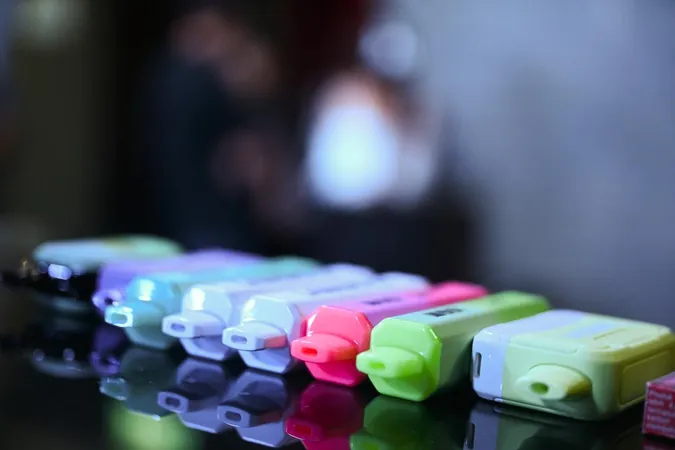
Vaping Crackdown: Temasek Poly's Bold Move to Battle E-Vaporisers
2025-08-24
Author: Arjun
Temasek Polytechnic Takes Action Against Vaping
In a highly publicized trial, Temasek Polytechnic (TP) recently uncovered that several students were vaping on campus, heightening the urgency to tackle this growing issue. A representative from TP confirmed that disciplinary actions were promptly taken, though specifics remained under wraps.
A New Era of Vape Detection
The polytechnic is currently testing vape detectors designed to help monitor and restrict vaping activities. As the trend continues to rise among teens, schools across Singapore are expressing serious interest in these detection devices. The trial at TP aims to evaluate how effective these detectors are and their potential for broader implementation.
Global Influence and Local Response
Vaping is not exclusive to Singapore; schools globally—from Britain to the United States—are also adopting vape detectors to curb student use. Despite some institutions like Republic Polytechnic (RP) stating they have no current plans for detection devices, others such as Singapore Polytechnic (SP) are actively considering their options in response to rising vape use.
How Vape Detectors Work
Vape detectors, resembling saucer-sized devices, monitor air quality by detecting smoke and aerosol particulates. Mr. Wilbert Tan from Innotec Solutions noted a dramatic uptick in interest for these devices, indicating that schools are more receptive to technological solutions against vaping.
Products like the Halo Smart Sensor by Motorola Solutions have garnered significant inquiries recently as schools look to combat the vaping epidemic. Not only do these smart sensors identify vape smoke, but they also detect loud noises and emergency cries for help, sending alerts immediately if tampered with.
Expert Perspectives on Vaping Prevention
According to law academic Mr. Ben Chester Cheong, the exploration of vape detectors is crucial at this juncture. He cautioned that delaying the use of such technologies risks normalizing vaping among students, making future interventions significantly harder.
He emphasized that effective deterrence requires sophisticated detection methods to counteract the lasting cultural acceptance of vaping within educational environments.
Shifting Cultural Norms
Principal N. Sivarajan of Sengkang Secondary echoed this sentiment, highlighting the need for students to develop responsible habits rather than rely solely on surveillance. His school encourages students to pledge against vaping, actively promoting a vape-free culture.
Government Initiatives and Increased Vigilance
During his National Day Rally speech, Prime Minister Lawrence Wong identified vaping as a serious public concern, indicating that a nationwide enforcement strategy would be enacted. Higher educational institutions have also stepped up patrols and educational initiatives aimed at combating vaping.
Innovative Solutions in Vaping Detection
Apart from vape detectors, novel solutions like rapid test kits for detecting substances laced in vapes have entered the scene. These kits allow schools to screen students quickly and discreetly, a vital step before engaging authorities.
Rising Trends in Student Vaping
Statistics reveal an alarming increase in reported vaping incidents among students, rising from 800 cases in 2022 to 2,000 in 2024. Educational institutions are responding with heightened security measures and educational programs to help students resist temptation.
With ongoing developments and new technologies surfacing, efforts to confront the vaping crisis are more critical than ever in ensuring a healthier, vape-free environment for students.



 Brasil (PT)
Brasil (PT)
 Canada (EN)
Canada (EN)
 Chile (ES)
Chile (ES)
 Česko (CS)
Česko (CS)
 대한민국 (KO)
대한민국 (KO)
 España (ES)
España (ES)
 France (FR)
France (FR)
 Hong Kong (EN)
Hong Kong (EN)
 Italia (IT)
Italia (IT)
 日本 (JA)
日本 (JA)
 Magyarország (HU)
Magyarország (HU)
 Norge (NO)
Norge (NO)
 Polska (PL)
Polska (PL)
 Schweiz (DE)
Schweiz (DE)
 Singapore (EN)
Singapore (EN)
 Sverige (SV)
Sverige (SV)
 Suomi (FI)
Suomi (FI)
 Türkiye (TR)
Türkiye (TR)
 الإمارات العربية المتحدة (AR)
الإمارات العربية المتحدة (AR)